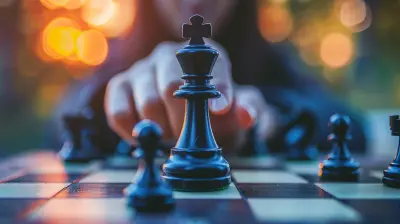Psychological Tools for Handling Conflict in Long-Term Relationships
13 December 2024
Let’s be real for a second: relationships are hard. I mean, really hard. Especially when they’re long-term. It doesn't matter how much you love your partner, at some point, conflict is going to rear its ugly head. And no, I’m not talking about the occasional disagreement over who left the dishes in the sink (although that can feel like the end of the world in the moment!). I’m talking about those deeper, more complex conflicts that can shake the very foundation of your relationship if left unchecked.
But here’s the good news – conflict doesn’t have to be the villain in your love story. In fact, with the right psychological tools, conflict can actually strengthen your relationship. Yep, you read that right! When handled correctly, conflict can be a catalyst for growth, understanding, and intimacy.
So, how do you go about handling conflict in a way that’s healthy, productive, and doesn’t leave either of you feeling like you’ve just gone twelve rounds in a boxing ring? Let’s dive into some psychological tools that can help.

1. Practice Active Listening
Ever been in the middle of an argument and realized you were only "hearing" your partner so you could respond, rather than truly listening? Yeah, we’ve all been there. This is where active listening comes into play. It's a game-changer.Active listening means you're fully focused on your partner, absorbing their words without planning your rebuttal. It’s about empathy – trying to understand their perspective, even if you don’t necessarily agree with it.
How to Practice Active Listening:
- Put away distractions. No phone, no TV, no half-hearted humming while scrolling Instagram.- Reflect back what you heard. Say something like, "So what you're saying is…" This shows you're engaged and ensures you’ve understood correctly.
- Validate their feelings. Even if you don’t agree, you can still acknowledge their emotions. Saying, "I see why that made you upset," can go a long way.
Active listening is like giving your partner a safe space to be heard. And when both people feel heard, it’s a lot easier to work through conflict without feeling defensive or misunderstood.

2. Use "I" Statements Instead of "You" Statements
Let me guess: When you’re upset, it’s easy to start sentences with, "You always..." or "You never..." But here’s the thing: phrases like this instantly put the other person on the defensive. It feels like an attack, and naturally, they’re going to fight back.A simple yet effective switch is to use "I statements" instead. This means focusing on your feelings and experiences rather than blaming your partner.
Examples of "I" Statements:
- Instead of "You never listen to me," say, "I feel unheard when we talk about important things."- Instead of "You always leave the house a mess," say, "I feel overwhelmed when the house is disorganized."
See the difference? Using "I" statements allows you to express your emotions without making your partner feel attacked, which makes it easier for them to hear you and respond compassionately.

3. Take a Timeout When Things Get Heated
We’ve all been there. You’re in the middle of an argument, and suddenly, it feels like everything is spiraling out of control. Voices are getting louder, tempers are flaring, and before you know it, you’re both saying things you regret.One of the best psychological tools for handling conflict is learning when to take a timeout. No, this isn’t about running away from the issue or sweeping it under the rug. It’s about giving yourselves a moment to cool down before things escalate further.
How to Use a Timeout Effectively:
- Communicate that you need a break. Say something like, "I’m feeling really overwhelmed right now. Can we take 15 minutes to calm down and come back to this?"- Set a specific time to revisit the issue. You don’t want to leave your partner hanging or make them feel like you’re avoiding the discussion. Agree on a time to continue the conversation once you’ve both had a chance to calm down.
- Use the break to self-regulate. Take deep breaths, go for a walk, or practice mindfulness. The goal is to come back to the conversation with a clearer head and a calmer heart.
Pausing the argument when emotions are high can help prevent saying things out of anger or frustration. It allows both of you to return to the conversation with a fresh perspective and a renewed sense of patience.

4. Understand the Power of Compromise
You’ve probably heard the saying, "Relationships are about compromise." And while that might sound cliché, it’s 100% true. No two people are going to agree on everything all the time, and that’s okay! The key is finding a middle ground where both of you feel heard and respected.Compromise doesn’t mean giving up what’s important to you; it means finding a solution that works for both of you. It’s about negotiation – not in a business-like way, but in a way that promotes mutual respect and understanding.
Tips for Healthy Compromise:
- Focus on the bigger picture. Ask yourself, "Is this issue worth damaging the relationship over?" Sometimes, letting go of the small stuff is the best way to maintain harmony.- Be willing to give a little. Relationships aren’t about “winning” or “losing.” If you’re both willing to bend a little, you’ll find that conflicts are resolved much more easily.
- Make it a win-win. Try to find a solution where both of you feel satisfied, even if it’s not exactly what either of you initially wanted.
Think of compromise like building a bridge between two different islands. Each of you has your own perspective, but meeting in the middle strengthens the relationship rather than causing division.
5. Practice Emotional Regulation
When conflict arises, emotions can run high. Anger, frustration, sadness – they all come flooding in, making it difficult to think clearly or communicate effectively. This is where emotional regulation comes in.Emotional regulation is the ability to manage and respond to your emotions in a healthy way. It’s about being aware of your feelings without letting them control your actions.
Ways to Improve Emotional Regulation:
- Mindfulness practices. Mindfulness helps you stay grounded in the present moment, making it easier to manage emotions as they arise.- Breathing exercises. Deep breathing can help calm your nervous system when you start to feel overwhelmed.
- Journaling. Sometimes writing about your feelings can help you process them and gain clarity before addressing the conflict with your partner.
By learning to regulate your emotions, you can avoid lashing out or acting impulsively during an argument. This leads to more productive and compassionate conversations.
6. Understand Attachment Styles
Did you know that your attachment style can heavily influence how you handle conflict in relationships? Based on early childhood experiences, attachment styles shape the way we connect with others, and they play a huge role in how we navigate disagreements.The Four Main Attachment Styles:
- Secure: Comfortable with intimacy and tends to communicate openly.- Anxious: Seeks constant reassurance and may feel insecure during conflict.
- Avoidant: Pulls away from intimacy and may avoid conflict altogether.
- Fearful-Avoidant: A mix of anxious and avoidant behaviors, often fearing getting too close but also fearing abandonment.
Understanding your attachment style (and your partner’s) can provide insight into why you both react the way you do during conflict. For example, if you have an anxious attachment style, you might feel panicked when your partner takes space during an argument. On the other hand, if your partner has an avoidant attachment style, they might need that space to process their feelings.
By understanding these dynamics, you can approach conflict with more empathy and patience, making it easier to navigate disagreements in a way that honors both of your needs.
7. Seek Professional Help if Needed
Let’s face it: sometimes, despite your best efforts, conflicts in a relationship can feel too big to handle on your own. And that’s okay! Seeking help from a therapist or counselor doesn’t mean your relationship is doomed. In fact, it’s one of the healthiest things you can do.Couples therapy can provide a safe space to discuss issues, improve communication, and learn new tools for handling conflict. A trained professional can offer insights and strategies that you might not have considered, helping you both grow as individuals and as partners.
When to Seek Professional Help:
- If conflicts are becoming more frequent or intense.- If you feel stuck in the same arguments with no resolution.
- If one or both of you are considering ending the relationship.
Therapy isn’t a last resort; it’s a proactive step toward building a stronger, healthier relationship.
Conclusion
Conflict is inevitable in long-term relationships, but it doesn’t have to be destructive. By practicing active listening, using “I” statements, taking timeouts, compromising, regulating your emotions, understanding attachment styles, and seeking help when needed, you can transform conflict into an opportunity for growth.Remember, the goal isn’t to avoid conflict entirely – it’s to handle it in a way that strengthens your relationship and deepens your connection.
all images in this post were generated using AI tools
Category:
Conflict ResolutionAuthor:

Janet Conrad
Discussion
rate this article
13 comments
Patrick Ford
This article offers practical strategies for navigating conflicts in long-term relationships. It emphasizes the importance of communication, empathy, and active listening, which are crucial for fostering understanding and resolution. These psychological tools can help couples strengthen their bond and maintain harmony over time.
February 3, 2025 at 5:01 PM

Janet Conrad
Thank you for your insightful comment! I'm glad you found the strategies on communication, empathy, and active listening helpful for strengthening relationships.
Christopher McCarron
Great insights! These tools are valuable for fostering understanding and harmony in relationships.
January 31, 2025 at 3:56 AM

Janet Conrad
Thank you! I'm glad you found the insights valuable for enhancing relationships.
Lisa McQuaid
Effective communication and empathy are essential tools for resolving conflicts in lasting relationships.
January 28, 2025 at 4:44 AM

Janet Conrad
Absolutely! Effective communication and empathy indeed serve as foundational tools for resolving conflicts and nurturing lasting relationships.
Harvey Schultz
What a delightful read! This article shines a bright light on the importance of psychological tools in nurturing long-term relationships. Embracing conflict with understanding and empathy can truly strengthen bonds. Thank you for sharing such valuable insights that can lead to happier, healthier connections! 🌟
January 23, 2025 at 4:07 AM

Janet Conrad
Thank you so much for your kind words! I'm glad you found the insights helpful for fostering stronger relationships. 😊
Galina McCarthy
Who knew conflict resolution could be as easy as sharing a pizza? Just remember, it's hard to argue with someone while they're munching on pepperoni!
January 20, 2025 at 4:04 AM

Janet Conrad
Absolutely! Sometimes, a simple gesture like sharing a pizza can break down barriers and foster connection during tough conversations.
Sebastian McTigue
Great article! Understanding and applying psychological tools can truly transform how we navigate conflicts in long-term relationships. Communication and empathy are key—definitely a must-read for anyone seeking harmony!
January 13, 2025 at 4:40 AM

Janet Conrad
Thank you for your kind words! I'm glad you found the article helpful. Emphasizing communication and empathy can indeed make a big difference in relationships.
Payton McManus
This article piques my curiosity! I wonder how specific psychological tools can transform long-standing conflicts into opportunities for growth and connection. Do certain techniques work better for different couples or situations?
January 4, 2025 at 3:53 AM

Janet Conrad
Thank you for your interest! Yes, specific psychological tools can indeed vary in effectiveness depending on the couple and the situation. Tailoring techniques to individual dynamics often leads to more meaningful growth and connection.
Kaleb McElveen
This article offers valuable insights into navigating conflict. Embracing these psychological tools can strengthen your connection and foster understanding in your long-term relationship. Keep growing together!
December 28, 2024 at 3:56 PM

Janet Conrad
Thank you for your thoughtful comment! I'm glad you found the insights helpful for nurturing relationships. Happy growing!
Ivory McHugh
In the intricate dance of long-term relationships, understanding the hidden triggers of conflict can unlock deeper connections. What if the key to harmony lies not in resolution, but in the unseen patterns shaping our interactions? Explore the shadows that influence our hearts.
December 25, 2024 at 4:57 AM

Janet Conrad
Absolutely! Recognizing and addressing these unseen patterns can deepen our understanding and enhance our emotional connection, making conflict resolution more effective and meaningful.
Adria Tucker
This article provides practical insights into managing conflict in long-term relationships. The psychological tools offered are straightforward and applicable, making it easier for couples to navigate disagreements and strengthen their connection. Valuable read!
December 18, 2024 at 3:25 PM

Janet Conrad
Thank you for your kind words! I'm glad you found the insights helpful for navigating conflict in relationships.
Lysander Barron
This article offers valuable strategies for navigating conflict, fostering understanding and resilience in long-term relationships. Great insights!
December 14, 2024 at 5:43 PM

Janet Conrad
Thank you for your kind words! I'm glad you found the strategies valuable for enhancing understanding and resilience in relationships.
Allegra Butler
Great insights! Effective communication and empathy are key to resolving conflicts. Remember, every challenge is an opportunity to strengthen your bond and deepen your understanding of each other!
December 13, 2024 at 4:13 PM

Janet Conrad
Thank you for your thoughtful comment! I completely agree—effective communication and empathy are vital for strengthening relationships through conflict.
Brandon Kelly
Conflict in long-term relationships often reveals deeper vulnerabilities. Embracing open communication and empathy not only resolves disputes but also fosters growth, strengthening the bond through shared understanding and resilience.
December 13, 2024 at 3:44 AM

Janet Conrad
Thank you for your insightful comment! You're absolutely right—open communication and empathy are essential for not only resolving conflicts but also for deepening connection and resilience in long-term relationships.
MORE POSTS

Trauma and the Body: How Stress Is Stored Physically

How to Use Mindfulness to Manage Anger and Frustration

Personality Types and Their Influence on Time Management

How to Create a Trauma-Informed Space for PTSD Recovery

The Role of Patience in Managing Conflicts

Emotional Regulation in the Face of Uncertainty

How Personality Shapes Your Conflict Resolution Approach

How Trauma Shapes Our Relationships and Attachments

The Role of Personality in Shaping Your Financial Habits